高考二轮复习英语语法专练(人教版)专题四 第3讲 并列句和状语从句学案(含答案)
文档属性
| 名称 | 高考二轮复习英语语法专练(人教版)专题四 第3讲 并列句和状语从句学案(含答案) | 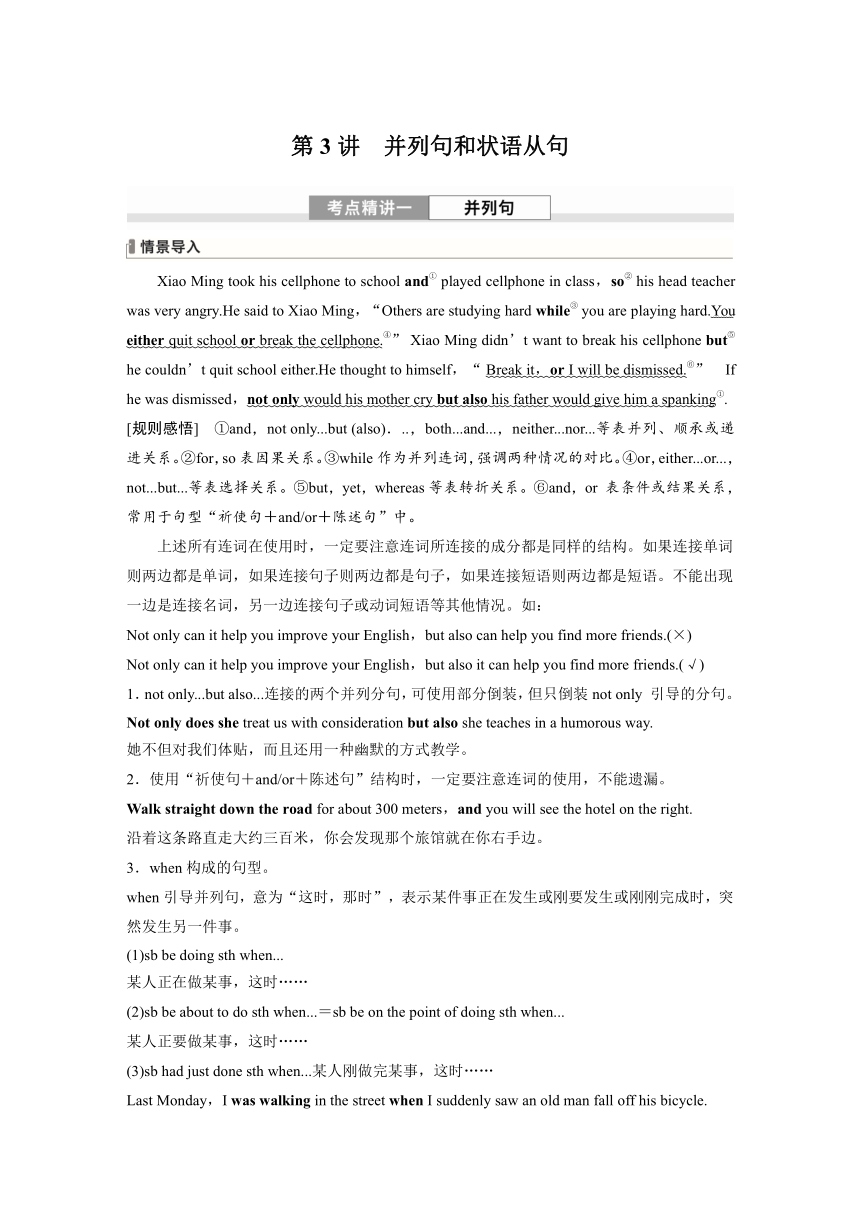 | |
| 格式 | docx | ||
| 文件大小 | 438.7KB | ||
| 资源类型 | 教案 | ||
| 版本资源 | 人教版(2019) | ||
| 科目 | 英语 | ||
| 更新时间 | 2023-05-09 16:27:09 | ||
图片预览

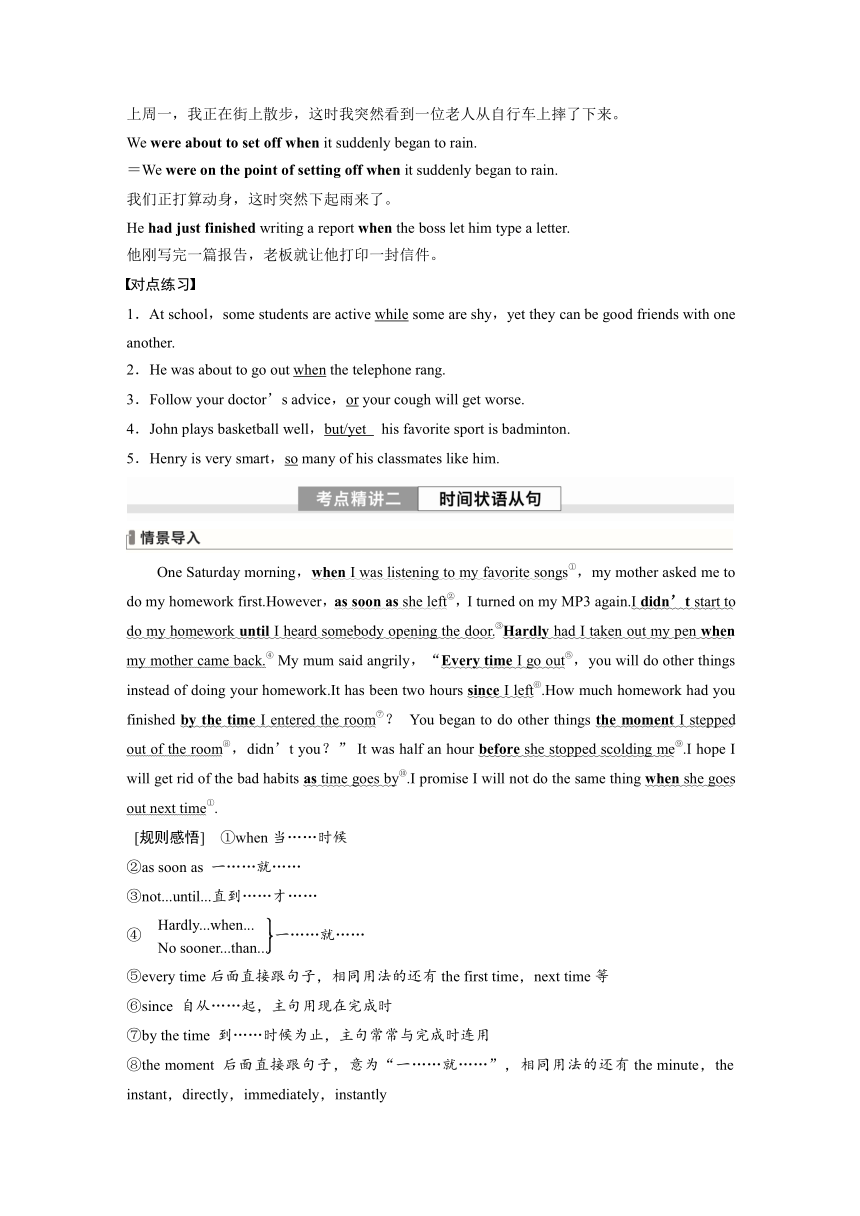
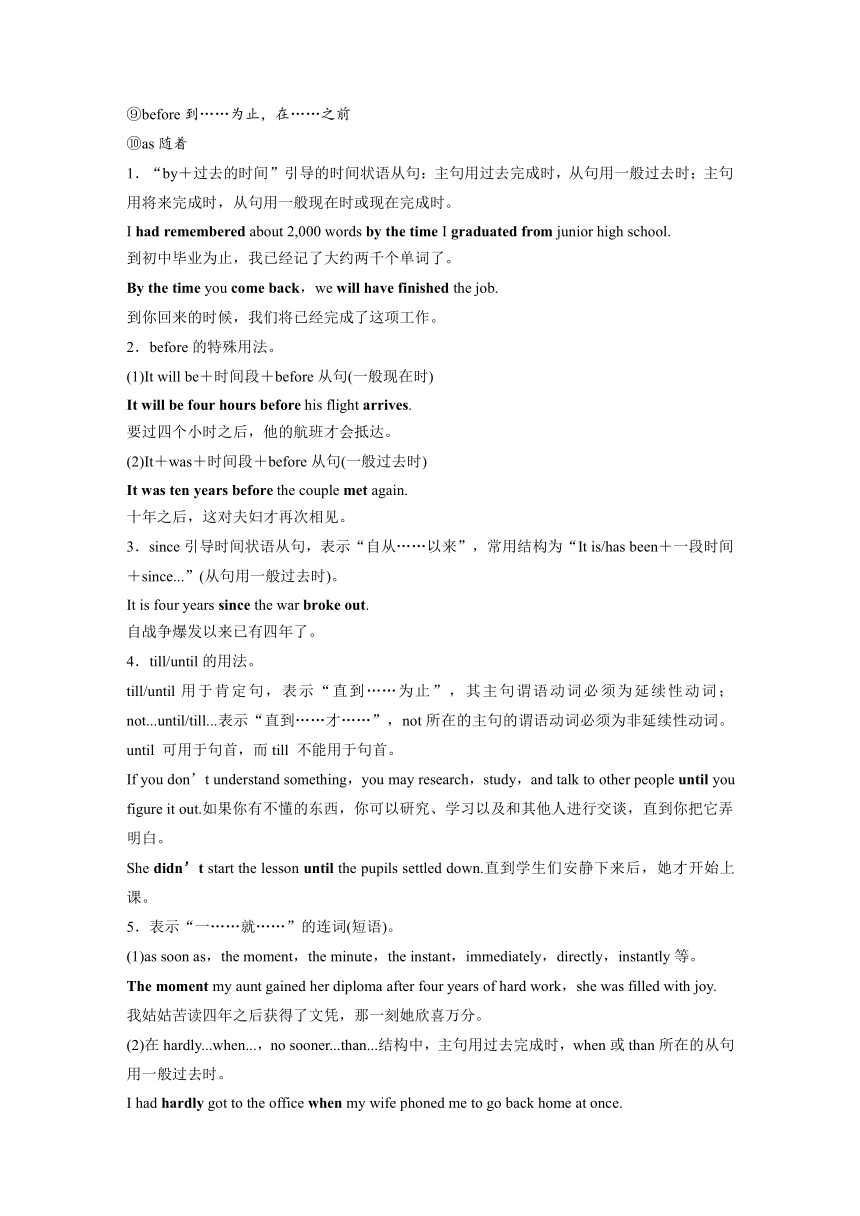
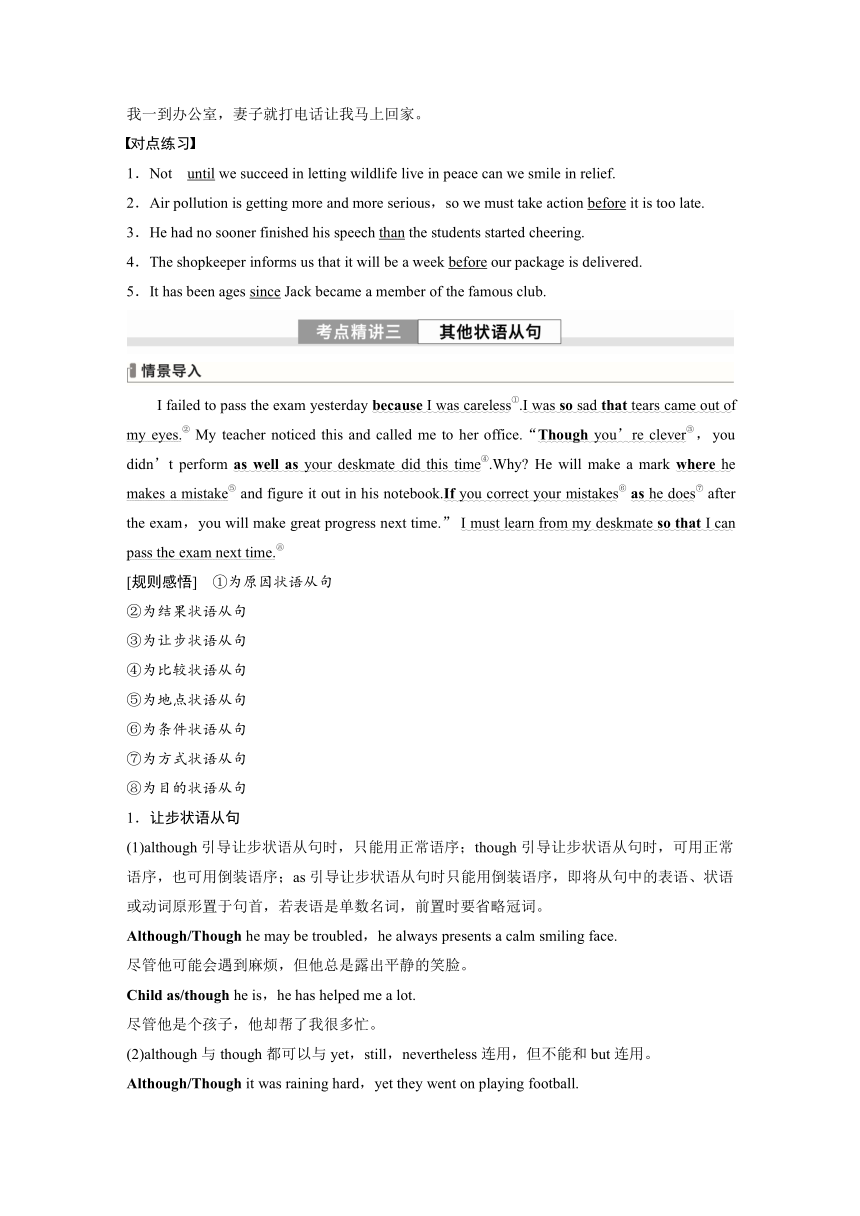
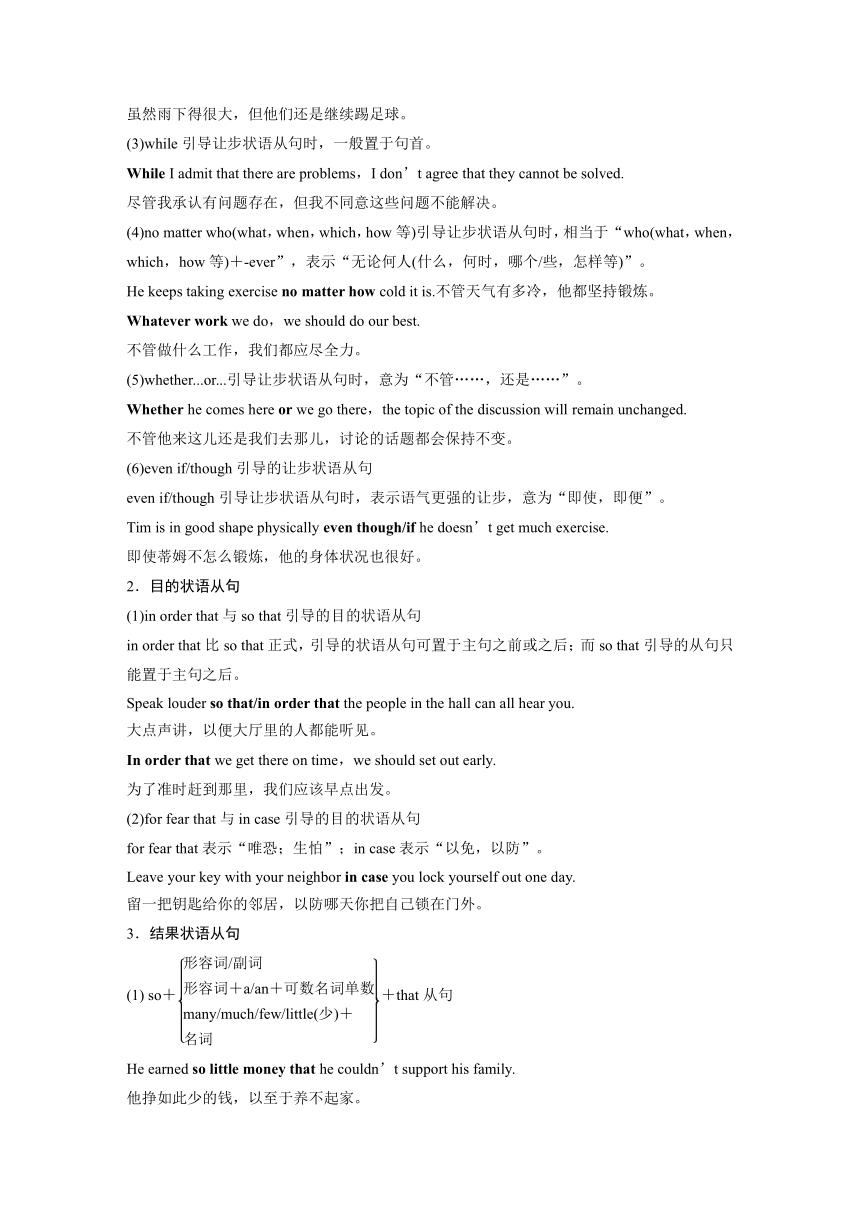
文档简介
第3讲 并列句和状语从句
Xiao Ming took his cellphone to school and① played cellphone in class,so② his head teacher was very angry.He said to Xiao Ming,“Others are studying hard while③ you are playing hard.You either quit school or break the cellphone.④” Xiao Ming didn’t want to break his cellphone but⑤ he couldn’t quit school either.He thought to himself,“ Break it,or I will be dismissed.⑥” If he was dismissed,not only would his mother cry but also his father would give him a spanking①.
[规则感悟] ①and,not only...but (also)...,both...and...,neither...nor...等表并列、顺承或递进关系。②for,so表因果关系。③while作为并列连词,强调两种情况的对比。④or,either...or...,not...but...等表选择关系。⑤but,yet,whereas等表转折关系。⑥and,or 表条件或结果关系,常用于句型“祈使句+and/or+陈述句”中。
上述所有连词在使用时,一定要注意连词所连接的成分都是同样的结构。如果连接单词则两边都是单词,如果连接句子则两边都是句子,如果连接短语则两边都是短语。不能出现一边是连接名词,另一边连接句子或动词短语等其他情况。如:
Not only can it help you improve your English,but also can help you find more friends.(×)
Not only can it help you improve your English,but also it can help you find more friends.(√)
1.not only...but also...连接的两个并列分句,可使用部分倒装,但只倒装not only 引导的分句。
Not only does she treat us with consideration but also she teaches in a humorous way.
她不但对我们体贴,而且还用一种幽默的方式教学。
2.使用“祈使句+and/or+陈述句”结构时,一定要注意连词的使用,不能遗漏。
Walk straight down the road for about 300 meters,and you will see the hotel on the right.
沿着这条路直走大约三百米,你会发现那个旅馆就在你右手边。
3.when构成的句型。
when引导并列句,意为“这时,那时”,表示某件事正在发生或刚要发生或刚刚完成时,突然发生另一件事。
(1)sb be doing sth when...
某人正在做某事,这时……
(2)sb be about to do sth when...=sb be on the point of doing sth when...
某人正要做某事,这时……
(3)sb had just done sth when...某人刚做完某事,这时……
Last Monday,I was walking in the street when I suddenly saw an old man fall off his bicycle.
上周一,我正在街上散步,这时我突然看到一位老人从自行车上摔了下来。
We were about to set off when it suddenly began to rain.
=We were on the point of setting off when it suddenly began to rain.
我们正打算动身,这时突然下起雨来了。
He had just finished writing a report when the boss let him type a letter.
他刚写完一篇报告,老板就让他打印一封信件。
对点练习
1.At school,some students are active while some are shy,yet they can be good friends with one another.
2.He was about to go out when the telephone rang.
3.Follow your doctor’s advice,or your cough will get worse.
4.John plays basketball well,but/yet his favorite sport is badminton.
5.Henry is very smart,so many of his classmates like him.
One Saturday morning,when I was listening to my favorite songs①,my mother asked me to do my homework first.However,as soon as she left②,I turned on my MP3 again.I didn’t start to do my homework until I heard somebody opening the door.③Hardly had I taken out my pen when my mother came back.④ My mum said angrily,“Every time I go out⑤,you will do other things instead of doing your homework.It has been two hours since I left⑥.How much homework had you finished by the time I entered the room⑦? You began to do other things the moment I stepped out of the room⑧,didn’t you?” It was half an hour before she stopped scolding me⑨.I hope I will get rid of the bad habits as time goes by⑩.I promise I will not do the same thing when she goes out next time①.
[规则感悟] ①when当……时候
②as soon as 一……就……
③not...until...直到……才……
④一……就……
⑤every time后面直接跟句子,相同用法的还有the first time,next time等
⑥since 自从……起,主句用现在完成时
⑦by the time 到……时候为止,主句常常与完成时连用
⑧the moment 后面直接跟句子,意为“一……就……”,相同用法的还有the minute,the instant,directly,immediately,instantly
⑨before到……为止,在……之前
⑩as随着
1.“by+过去的时间”引导的时间状语从句:主句用过去完成时,从句用一般过去时;主句用将来完成时,从句用一般现在时或现在完成时。
I had remembered about 2,000 words by the time I graduated from junior high school.
到初中毕业为止,我已经记了大约两千个单词了。
By the time you come back,we will have finished the job.
到你回来的时候,我们将已经完成了这项工作。
2.before的特殊用法。
(1)It will be+时间段+before从句(一般现在时)
It will be four hours before his flight arrives.
要过四个小时之后,他的航班才会抵达。
(2)It+was+时间段+before从句(一般过去时)
It was ten years before the couple met again.
十年之后,这对夫妇才再次相见。
3.since引导时间状语从句,表示“自从……以来”,常用结构为“It is/has been+一段时间+since...”(从句用一般过去时)。
It is four years since the war broke out.
自战争爆发以来已有四年了。
4.till/until的用法。
till/until用于肯定句,表示“直到……为止”,其主句谓语动词必须为延续性动词;not...until/till...表示“直到……才……”,not所在的主句的谓语动词必须为非延续性动词。until 可用于句首,而till 不能用于句首。
If you don’t understand something,you may research,study,and talk to other people until you figure it out.如果你有不懂的东西,你可以研究、学习以及和其他人进行交谈,直到你把它弄明白。
She didn’t start the lesson until the pupils settled down.直到学生们安静下来后,她才开始上课。
5.表示“一……就……”的连词(短语)。
(1)as soon as,the moment,the minute,the instant,immediately,directly,instantly等。
The moment my aunt gained her diploma after four years of hard work,she was filled with joy.
我姑姑苦读四年之后获得了文凭,那一刻她欣喜万分。
(2)在hardly...when...,no sooner...than...结构中,主句用过去完成时,when或than所在的从句用一般过去时。
I had hardly got to the office when my wife phoned me to go back home at once.
我一到办公室,妻子就打电话让我马上回家。
对点练习
1.Not until we succeed in letting wildlife live in peace can we smile in relief.
2.Air pollution is getting more and more serious,so we must take action before it is too late.
3.He had no sooner finished his speech than the students started cheering.
4.The shopkeeper informs us that it will be a week before our package is delivered.
5.It has been ages since Jack became a member of the famous club.
I failed to pass the exam yesterday because I was careless①.I was so sad that tears came out of my eyes.② My teacher noticed this and called me to her office.“Though you’re clever③,you didn’t perform as well as your deskmate did this time④.Why He will make a mark where he makes a mistake⑤ and figure it out in his notebook.If you correct your mistakes⑥ as he does⑦ after the exam,you will make great progress next time.” I must learn from my deskmate so that I can pass the exam next time.⑧
[规则感悟] ①为原因状语从句
②为结果状语从句
③为让步状语从句
④为比较状语从句
⑤为地点状语从句
⑥为条件状语从句
⑦为方式状语从句
⑧为目的状语从句
1.让步状语从句
(1)although引导让步状语从句时,只能用正常语序;though引导让步状语从句时,可用正常语序,也可用倒装语序;as引导让步状语从句时只能用倒装语序,即将从句中的表语、状语或动词原形置于句首,若表语是单数名词,前置时要省略冠词。
Although/Though he may be troubled,he always presents a calm smiling face.
尽管他可能会遇到麻烦,但他总是露出平静的笑脸。
Child as/though he is,he has helped me a lot.
尽管他是个孩子,他却帮了我很多忙。
(2)although与though都可以与yet,still,nevertheless连用,但不能和but连用。
Although/Though it was raining hard,yet they went on playing football.
虽然雨下得很大,但他们还是继续踢足球。
(3)while引导让步状语从句时,一般置于句首。
While I admit that there are problems,I don’t agree that they cannot be solved.
尽管我承认有问题存在,但我不同意这些问题不能解决。
(4)no matter who(what,when,which,how等)引导让步状语从句时,相当于“who(what,when,which,how等)+-ever”,表示“无论何人(什么,何时,哪个/些,怎样等)”。
He keeps taking exercise no matter how cold it is.不管天气有多冷,他都坚持锻炼。
Whatever work we do,we should do our best.
不管做什么工作,我们都应尽全力。
(5)whether...or...引导让步状语从句时,意为“不管……,还是……”。
Whether he comes here or we go there,the topic of the discussion will remain unchanged.
不管他来这儿还是我们去那儿,讨论的话题都会保持不变。
(6)even if/though引导的让步状语从句
even if/though引导让步状语从句时,表示语气更强的让步,意为“即使,即便”。
Tim is in good shape physically even though/if he doesn’t get much exercise.
即使蒂姆不怎么锻炼,他的身体状况也很好。
2.目的状语从句
(1)in order that与so that引导的目的状语从句
in order that比so that正式,引导的状语从句可置于主句之前或之后;而so that引导的从句只能置于主句之后。
Speak louder so that/in order that the people in the hall can all hear you.
大点声讲,以便大厅里的人都能听见。
In order that we get there on time,we should set out early.
为了准时赶到那里,我们应该早点出发。
(2)for fear that与in case引导的目的状语从句
for fear that表示“唯恐;生怕”;in case表示“以免,以防”。
Leave your key with your neighbor in case you lock yourself out one day.
留一把钥匙给你的邻居,以防哪天你把自己锁在门外。
3.结果状语从句
(1) so++that从句
He earned so little money that he couldn’t support his family.
他挣如此少的钱,以至于养不起家。
(2) such++that从句
He is such a learned person that we all admire him very much.=He is so learned a person that we all admire him very much.
他是如此知识渊博的一个人,以至于我们都非常欣赏他。
注意:当“so+adj./adv.”或“such+n.”置于句首时,主句要部分倒装。
So anxious am I that I can’t sleep until deep into the night.
我是如此焦虑以至于直到深夜我才能睡着。
(3)so that也可以引导结果状语从句,从句中往往没有情态动词,而且主从句之间常用逗号隔开。
He didn’t obey the contract,so that he was fined.
他没有遵守合约,因此他被罚了款。
4.条件状语从句
if,unless,so/as long as,in case,on condition that,supposing/suppose (that)等都可以引导条件状语从句。条件状语从句要注意“主将从现”的用法。
unless意义上等于if not,在应用时如果不把握可以用if not 替换一下,讲得通的话,才能使用unless。
You’ll fail the exam unless you study hard.
除非你努力学习,否则你会考试不及格。
5.地点状语从句
where意为“在某个地方”;wherever意为“无论在哪里”。
You can sit wherever you like.
你喜欢坐哪儿都可以。
6.原因状语从句
because意为“因为”,语气强烈,表示事情发生的直接原因,常用来回答why的提问;since意为“既然,由于”,语气较弱,通常置于句首,表示说话双方都知道的原因;as表示双方已知的事实或显而易见的原因,含义与since相同,但语气更弱;now that意为“既然,由于”,用已成事实的原因作为前提。
Now that you’ve grown up,you must learn to stand on your own feet.
你既然已经长大成人,就得学会独立生活。
对点练习
1.Well,I’m working on a huge assignment and if I don’t do well,it will ruin my reputation as an excellent accountant!
2.Wherever she goes,there are crowds of people waiting to see her.
3.Ugly as/though the dog is,it is quite gentle and friendly.
4.If guests are seated at the table,hosts may serve the food,or it may be passed so that each person may help himself.
5.Enjoying a fresh morning is important because/as it can set the mood for the rest of the day.
6.He speaks so slowly and strangely that it takes patience to understand what he is saying.
7.They treat her as though/if she were their daughter.
8.As long as insects happen to touch the webs,no matter how hard they try,they can’t escape.
1.In a study of 33 years of trends in Body Mass Index(体重指数) across 200 countries,the scientists found that people worldwide are getting heavier and that most of the rise is due to gains in BMI in rural areas.(2021·浙江1月)
2.While some people are motivated by a need for success,others are motivated by a fear of failure.(2016·江苏)
3.I really enjoy listening to music because it helps me relax and takes my mind away from other cares of the day.(2016·北京)
4.We need to get to the root of the problem before we can solve it.(2015·天津)
层级一 基础达标练
单句语法填空
1.The explosion rocked the lake with such a force that dead fish immediately began to surface.
2.In addition,forests have been decreasing rapidly because/as too many trees have been cut down.
3.Most importantly,remember the following old rule:try to eat different foods,but/yet not too much.
4.Never lose heart and you’ll make a quick advance in your project.
5.I had hardly sat down on the train and opened a bar of chocolate when an old man with huge bags sat down across from me.
6.If you visit Nepal,you will find Nepalese often greet each other with the hands pressed together instead of shaking hands,while in North America and the U.K.,people greet one another by shaking hands.
7.In the state of Iowa,if you live more than a mile away from school you can get a school permit.
8.Ten years later I still keep in touch with my classmates,though/although I’ve never met them after graduation.
9.But for now,they all have to postpone their plans until/till the winter storms pass.
10.Do remember that it is unwise to trust him,whatever he says.
层级二 高考真题练
单句语法填空
1.He hung on for a few minutes and screamed for his father,but his father didn’t hear him.(2022·新高考全国Ⅱ)
2.Feeling fearful is healthy because it helps you slow down and evaluate risks properly.
(2021·天津6月)
3.We all need to get involved in saving energy whether it’s at work,at home,or at school.(2021·天津3月)
4.We hired our bikes from the rental place at the South Gate.My bike was old and shaky but did the job.It took us about 3 hours to go all the way around the Xi’an City Wall.(2021·全国甲)
5.It was not widely accepted as a travel concept until/till the late 1980s.(2021·全国乙)
6.They kept their collection at home until it got too big or until they died,and then it was given to a museum.(2020·新高考全国Ⅰ)
7.When/As he asked the villagers on the banks of the river where he could find the legendary(传奇的) artist,they smiled and pointed down the river.(2020·全国Ⅲ)
8.—Why do people like pop music I hate it so much.
—Even if/though it is not your style,that doesn’t mean it is bad.(2020·天津7月)
9.Tom is so independent that he never asks his parents’ opinion unless he wants their support.(2019·天津6月)
10.If we don’t stop climate change,many animals and plants in the world will be gone.
(2018·北京)
层级三 语篇提能练
语法填空
Few people I know seem to have much desire or time to cook.Making Chinese dishes is seen as especially troublesome.Many westerners 1. come to China cook much less 2.______ in their own countries once they realize how cheap it can be to eat out.I still remember 3._____ (visit) a friend who’d lived here for five years and I was shocked 4. I learnt she hadn’t cooked once in all that time.
5. regularly eating out seems to have become common for many young people in recent years,it’s not without a cost.The obvious one is money;eating out once or twice a week may be affordable 6. doing this most days adds up.There could be an even 7.______(high) cost on your health.Researchers have found that there is a direct link between the increase in food eaten outside the home and the rise in weight problems.
8. you are not going to suffer this problem,then I suggest that the next time you go to your mum’s home 9. dinner,get a few cooking tips from her.Cooking food can be fun.You might also begin to notice the effects not only on your health 10. in your pocket.
语篇解读 本文是一篇说明文。作者分析了外出就餐的代价,并建议我们要尝试自己做饭,这样做不仅对自身健康有好处还能节约开支。
1.答案 who/that
解析 考查定语从句的关系词。先行词是westerners(西方人),用who或that引导限制性定语从句,并在从句中作主语。
2.答案 than
解析 考查介词。根据句意可知,此处为比较级,故填than。
3.答案 visiting
解析 考查动名词作宾语。remember doing sth记得做过某事。
4.答案 when
解析 考查连词。此处为时间状语从句,表示“当……的时候”,故用when。
5.答案 While/Though/Although
解析 考查连词。此处引导让步状语从句,表示“虽然,尽管”;句首单词首字母需大写,故填While/Though/Although。
6.答案 but
解析 考查连词。前后语义为转折关系,故填but。
7.答案 higher
解析 考查形容词的比较级。“副词even+比较级”表示“更……”,强调程度。
8.答案 If
解析 考查条件状语从句。根据句意可知填if,且位于句首,首字母需大写。故填If。
9.答案 for
解析 考查介词。go to your mum’s home for dinner去你妈妈家吃饭。for表示目的,意为“为了要,为了得到”。
10.答案 but
解析 考查连词。not only...but (also)...不但……而且……,为固定搭配,also可省略。故填but。
1.not only...but (also)...
(2022·全国甲)海洋不仅给我们提供了充足的食物,而且它还保持了自然的平衡。
Not only does the ocean offer us sufficient food,but it also maintains the balance of nature.
(2021·新高考全国Ⅰ)Youth的专栏Cultures Around the World不仅拓宽了我的视野,也让我有机会体验不同的文化。
Not only does Cultures Around the World,a column of Youth,broaden my horizons,but it (also) gives me an opportunity to experience different cultures.
2.祈使句+and/or+陈述句
(2019·北京)提前从网上预订票和房间,你会有更多的时间去观光。
Book tickets and rooms online in advance,and you will have more time to go sightseeing.
(2021·浙江6月)来参观展览吧,你将会享受一场视觉盛宴。
Come to the exhibition,and you will enjoy a visual feast.
3.so...that...引导结果状语从句
(2022·新高考全国Ⅰ)你在英语口语方面如此精通,我们都将从你的演讲中受益匪浅。
You are so expert at spoken English that we all will benefit much from your speech.
(2021·新高考全国Ⅰ)惊喜是如此甜蜜,她兴奋地摇了摇正假装打鼾的丈夫。
The surprise was so sweet that she excitedly shook her husband,who was pretending to snore.
4.be doing...when...
(2017·浙江6月)马克正在想接下来该怎么办,正在那时,一只手把他拉进了车里。
Mac was wondering what to do next when a hand pulled him into the car.
(2017·浙江11月)我们正在找地方搭帐篷,这时妈妈告诉我们她忘了带帐篷。
We were looking for a place to put up the tent when Mother told us that she had forgotten to take it.
5.not until...
(2020·浙江7月)直到似乎过了半个世纪之后,我们才听到了直升机的声音。
Not until what seemed like half a century later did we hear the roar of the helicopter.
(2021·北京)直到昨天我才得知我们班这个周末要开一个重要的会议——正好是我们将要见面的时间。
Not until yesterday was I informed that our class was going to hold an important meeting this weekend—exactly the time when we shall meet.
Xiao Ming took his cellphone to school and① played cellphone in class,so② his head teacher was very angry.He said to Xiao Ming,“Others are studying hard while③ you are playing hard.You either quit school or break the cellphone.④” Xiao Ming didn’t want to break his cellphone but⑤ he couldn’t quit school either.He thought to himself,“ Break it,or I will be dismissed.⑥” If he was dismissed,not only would his mother cry but also his father would give him a spanking①.
[规则感悟] ①and,not only...but (also)...,both...and...,neither...nor...等表并列、顺承或递进关系。②for,so表因果关系。③while作为并列连词,强调两种情况的对比。④or,either...or...,not...but...等表选择关系。⑤but,yet,whereas等表转折关系。⑥and,or 表条件或结果关系,常用于句型“祈使句+and/or+陈述句”中。
上述所有连词在使用时,一定要注意连词所连接的成分都是同样的结构。如果连接单词则两边都是单词,如果连接句子则两边都是句子,如果连接短语则两边都是短语。不能出现一边是连接名词,另一边连接句子或动词短语等其他情况。如:
Not only can it help you improve your English,but also can help you find more friends.(×)
Not only can it help you improve your English,but also it can help you find more friends.(√)
1.not only...but also...连接的两个并列分句,可使用部分倒装,但只倒装not only 引导的分句。
Not only does she treat us with consideration but also she teaches in a humorous way.
她不但对我们体贴,而且还用一种幽默的方式教学。
2.使用“祈使句+and/or+陈述句”结构时,一定要注意连词的使用,不能遗漏。
Walk straight down the road for about 300 meters,and you will see the hotel on the right.
沿着这条路直走大约三百米,你会发现那个旅馆就在你右手边。
3.when构成的句型。
when引导并列句,意为“这时,那时”,表示某件事正在发生或刚要发生或刚刚完成时,突然发生另一件事。
(1)sb be doing sth when...
某人正在做某事,这时……
(2)sb be about to do sth when...=sb be on the point of doing sth when...
某人正要做某事,这时……
(3)sb had just done sth when...某人刚做完某事,这时……
Last Monday,I was walking in the street when I suddenly saw an old man fall off his bicycle.
上周一,我正在街上散步,这时我突然看到一位老人从自行车上摔了下来。
We were about to set off when it suddenly began to rain.
=We were on the point of setting off when it suddenly began to rain.
我们正打算动身,这时突然下起雨来了。
He had just finished writing a report when the boss let him type a letter.
他刚写完一篇报告,老板就让他打印一封信件。
对点练习
1.At school,some students are active while some are shy,yet they can be good friends with one another.
2.He was about to go out when the telephone rang.
3.Follow your doctor’s advice,or your cough will get worse.
4.John plays basketball well,but/yet his favorite sport is badminton.
5.Henry is very smart,so many of his classmates like him.
One Saturday morning,when I was listening to my favorite songs①,my mother asked me to do my homework first.However,as soon as she left②,I turned on my MP3 again.I didn’t start to do my homework until I heard somebody opening the door.③Hardly had I taken out my pen when my mother came back.④ My mum said angrily,“Every time I go out⑤,you will do other things instead of doing your homework.It has been two hours since I left⑥.How much homework had you finished by the time I entered the room⑦? You began to do other things the moment I stepped out of the room⑧,didn’t you?” It was half an hour before she stopped scolding me⑨.I hope I will get rid of the bad habits as time goes by⑩.I promise I will not do the same thing when she goes out next time①.
[规则感悟] ①when当……时候
②as soon as 一……就……
③not...until...直到……才……
④一……就……
⑤every time后面直接跟句子,相同用法的还有the first time,next time等
⑥since 自从……起,主句用现在完成时
⑦by the time 到……时候为止,主句常常与完成时连用
⑧the moment 后面直接跟句子,意为“一……就……”,相同用法的还有the minute,the instant,directly,immediately,instantly
⑨before到……为止,在……之前
⑩as随着
1.“by+过去的时间”引导的时间状语从句:主句用过去完成时,从句用一般过去时;主句用将来完成时,从句用一般现在时或现在完成时。
I had remembered about 2,000 words by the time I graduated from junior high school.
到初中毕业为止,我已经记了大约两千个单词了。
By the time you come back,we will have finished the job.
到你回来的时候,我们将已经完成了这项工作。
2.before的特殊用法。
(1)It will be+时间段+before从句(一般现在时)
It will be four hours before his flight arrives.
要过四个小时之后,他的航班才会抵达。
(2)It+was+时间段+before从句(一般过去时)
It was ten years before the couple met again.
十年之后,这对夫妇才再次相见。
3.since引导时间状语从句,表示“自从……以来”,常用结构为“It is/has been+一段时间+since...”(从句用一般过去时)。
It is four years since the war broke out.
自战争爆发以来已有四年了。
4.till/until的用法。
till/until用于肯定句,表示“直到……为止”,其主句谓语动词必须为延续性动词;not...until/till...表示“直到……才……”,not所在的主句的谓语动词必须为非延续性动词。until 可用于句首,而till 不能用于句首。
If you don’t understand something,you may research,study,and talk to other people until you figure it out.如果你有不懂的东西,你可以研究、学习以及和其他人进行交谈,直到你把它弄明白。
She didn’t start the lesson until the pupils settled down.直到学生们安静下来后,她才开始上课。
5.表示“一……就……”的连词(短语)。
(1)as soon as,the moment,the minute,the instant,immediately,directly,instantly等。
The moment my aunt gained her diploma after four years of hard work,she was filled with joy.
我姑姑苦读四年之后获得了文凭,那一刻她欣喜万分。
(2)在hardly...when...,no sooner...than...结构中,主句用过去完成时,when或than所在的从句用一般过去时。
I had hardly got to the office when my wife phoned me to go back home at once.
我一到办公室,妻子就打电话让我马上回家。
对点练习
1.Not until we succeed in letting wildlife live in peace can we smile in relief.
2.Air pollution is getting more and more serious,so we must take action before it is too late.
3.He had no sooner finished his speech than the students started cheering.
4.The shopkeeper informs us that it will be a week before our package is delivered.
5.It has been ages since Jack became a member of the famous club.
I failed to pass the exam yesterday because I was careless①.I was so sad that tears came out of my eyes.② My teacher noticed this and called me to her office.“Though you’re clever③,you didn’t perform as well as your deskmate did this time④.Why He will make a mark where he makes a mistake⑤ and figure it out in his notebook.If you correct your mistakes⑥ as he does⑦ after the exam,you will make great progress next time.” I must learn from my deskmate so that I can pass the exam next time.⑧
[规则感悟] ①为原因状语从句
②为结果状语从句
③为让步状语从句
④为比较状语从句
⑤为地点状语从句
⑥为条件状语从句
⑦为方式状语从句
⑧为目的状语从句
1.让步状语从句
(1)although引导让步状语从句时,只能用正常语序;though引导让步状语从句时,可用正常语序,也可用倒装语序;as引导让步状语从句时只能用倒装语序,即将从句中的表语、状语或动词原形置于句首,若表语是单数名词,前置时要省略冠词。
Although/Though he may be troubled,he always presents a calm smiling face.
尽管他可能会遇到麻烦,但他总是露出平静的笑脸。
Child as/though he is,he has helped me a lot.
尽管他是个孩子,他却帮了我很多忙。
(2)although与though都可以与yet,still,nevertheless连用,但不能和but连用。
Although/Though it was raining hard,yet they went on playing football.
虽然雨下得很大,但他们还是继续踢足球。
(3)while引导让步状语从句时,一般置于句首。
While I admit that there are problems,I don’t agree that they cannot be solved.
尽管我承认有问题存在,但我不同意这些问题不能解决。
(4)no matter who(what,when,which,how等)引导让步状语从句时,相当于“who(what,when,which,how等)+-ever”,表示“无论何人(什么,何时,哪个/些,怎样等)”。
He keeps taking exercise no matter how cold it is.不管天气有多冷,他都坚持锻炼。
Whatever work we do,we should do our best.
不管做什么工作,我们都应尽全力。
(5)whether...or...引导让步状语从句时,意为“不管……,还是……”。
Whether he comes here or we go there,the topic of the discussion will remain unchanged.
不管他来这儿还是我们去那儿,讨论的话题都会保持不变。
(6)even if/though引导的让步状语从句
even if/though引导让步状语从句时,表示语气更强的让步,意为“即使,即便”。
Tim is in good shape physically even though/if he doesn’t get much exercise.
即使蒂姆不怎么锻炼,他的身体状况也很好。
2.目的状语从句
(1)in order that与so that引导的目的状语从句
in order that比so that正式,引导的状语从句可置于主句之前或之后;而so that引导的从句只能置于主句之后。
Speak louder so that/in order that the people in the hall can all hear you.
大点声讲,以便大厅里的人都能听见。
In order that we get there on time,we should set out early.
为了准时赶到那里,我们应该早点出发。
(2)for fear that与in case引导的目的状语从句
for fear that表示“唯恐;生怕”;in case表示“以免,以防”。
Leave your key with your neighbor in case you lock yourself out one day.
留一把钥匙给你的邻居,以防哪天你把自己锁在门外。
3.结果状语从句
(1) so++that从句
He earned so little money that he couldn’t support his family.
他挣如此少的钱,以至于养不起家。
(2) such++that从句
He is such a learned person that we all admire him very much.=He is so learned a person that we all admire him very much.
他是如此知识渊博的一个人,以至于我们都非常欣赏他。
注意:当“so+adj./adv.”或“such+n.”置于句首时,主句要部分倒装。
So anxious am I that I can’t sleep until deep into the night.
我是如此焦虑以至于直到深夜我才能睡着。
(3)so that也可以引导结果状语从句,从句中往往没有情态动词,而且主从句之间常用逗号隔开。
He didn’t obey the contract,so that he was fined.
他没有遵守合约,因此他被罚了款。
4.条件状语从句
if,unless,so/as long as,in case,on condition that,supposing/suppose (that)等都可以引导条件状语从句。条件状语从句要注意“主将从现”的用法。
unless意义上等于if not,在应用时如果不把握可以用if not 替换一下,讲得通的话,才能使用unless。
You’ll fail the exam unless you study hard.
除非你努力学习,否则你会考试不及格。
5.地点状语从句
where意为“在某个地方”;wherever意为“无论在哪里”。
You can sit wherever you like.
你喜欢坐哪儿都可以。
6.原因状语从句
because意为“因为”,语气强烈,表示事情发生的直接原因,常用来回答why的提问;since意为“既然,由于”,语气较弱,通常置于句首,表示说话双方都知道的原因;as表示双方已知的事实或显而易见的原因,含义与since相同,但语气更弱;now that意为“既然,由于”,用已成事实的原因作为前提。
Now that you’ve grown up,you must learn to stand on your own feet.
你既然已经长大成人,就得学会独立生活。
对点练习
1.Well,I’m working on a huge assignment and if I don’t do well,it will ruin my reputation as an excellent accountant!
2.Wherever she goes,there are crowds of people waiting to see her.
3.Ugly as/though the dog is,it is quite gentle and friendly.
4.If guests are seated at the table,hosts may serve the food,or it may be passed so that each person may help himself.
5.Enjoying a fresh morning is important because/as it can set the mood for the rest of the day.
6.He speaks so slowly and strangely that it takes patience to understand what he is saying.
7.They treat her as though/if she were their daughter.
8.As long as insects happen to touch the webs,no matter how hard they try,they can’t escape.
1.In a study of 33 years of trends in Body Mass Index(体重指数) across 200 countries,the scientists found that people worldwide are getting heavier and that most of the rise is due to gains in BMI in rural areas.(2021·浙江1月)
2.While some people are motivated by a need for success,others are motivated by a fear of failure.(2016·江苏)
3.I really enjoy listening to music because it helps me relax and takes my mind away from other cares of the day.(2016·北京)
4.We need to get to the root of the problem before we can solve it.(2015·天津)
层级一 基础达标练
单句语法填空
1.The explosion rocked the lake with such a force that dead fish immediately began to surface.
2.In addition,forests have been decreasing rapidly because/as too many trees have been cut down.
3.Most importantly,remember the following old rule:try to eat different foods,but/yet not too much.
4.Never lose heart and you’ll make a quick advance in your project.
5.I had hardly sat down on the train and opened a bar of chocolate when an old man with huge bags sat down across from me.
6.If you visit Nepal,you will find Nepalese often greet each other with the hands pressed together instead of shaking hands,while in North America and the U.K.,people greet one another by shaking hands.
7.In the state of Iowa,if you live more than a mile away from school you can get a school permit.
8.Ten years later I still keep in touch with my classmates,though/although I’ve never met them after graduation.
9.But for now,they all have to postpone their plans until/till the winter storms pass.
10.Do remember that it is unwise to trust him,whatever he says.
层级二 高考真题练
单句语法填空
1.He hung on for a few minutes and screamed for his father,but his father didn’t hear him.(2022·新高考全国Ⅱ)
2.Feeling fearful is healthy because it helps you slow down and evaluate risks properly.
(2021·天津6月)
3.We all need to get involved in saving energy whether it’s at work,at home,or at school.(2021·天津3月)
4.We hired our bikes from the rental place at the South Gate.My bike was old and shaky but did the job.It took us about 3 hours to go all the way around the Xi’an City Wall.(2021·全国甲)
5.It was not widely accepted as a travel concept until/till the late 1980s.(2021·全国乙)
6.They kept their collection at home until it got too big or until they died,and then it was given to a museum.(2020·新高考全国Ⅰ)
7.When/As he asked the villagers on the banks of the river where he could find the legendary(传奇的) artist,they smiled and pointed down the river.(2020·全国Ⅲ)
8.—Why do people like pop music I hate it so much.
—Even if/though it is not your style,that doesn’t mean it is bad.(2020·天津7月)
9.Tom is so independent that he never asks his parents’ opinion unless he wants their support.(2019·天津6月)
10.If we don’t stop climate change,many animals and plants in the world will be gone.
(2018·北京)
层级三 语篇提能练
语法填空
Few people I know seem to have much desire or time to cook.Making Chinese dishes is seen as especially troublesome.Many westerners 1. come to China cook much less 2.______ in their own countries once they realize how cheap it can be to eat out.I still remember 3._____ (visit) a friend who’d lived here for five years and I was shocked 4. I learnt she hadn’t cooked once in all that time.
5. regularly eating out seems to have become common for many young people in recent years,it’s not without a cost.The obvious one is money;eating out once or twice a week may be affordable 6. doing this most days adds up.There could be an even 7.______(high) cost on your health.Researchers have found that there is a direct link between the increase in food eaten outside the home and the rise in weight problems.
8. you are not going to suffer this problem,then I suggest that the next time you go to your mum’s home 9. dinner,get a few cooking tips from her.Cooking food can be fun.You might also begin to notice the effects not only on your health 10. in your pocket.
语篇解读 本文是一篇说明文。作者分析了外出就餐的代价,并建议我们要尝试自己做饭,这样做不仅对自身健康有好处还能节约开支。
1.答案 who/that
解析 考查定语从句的关系词。先行词是westerners(西方人),用who或that引导限制性定语从句,并在从句中作主语。
2.答案 than
解析 考查介词。根据句意可知,此处为比较级,故填than。
3.答案 visiting
解析 考查动名词作宾语。remember doing sth记得做过某事。
4.答案 when
解析 考查连词。此处为时间状语从句,表示“当……的时候”,故用when。
5.答案 While/Though/Although
解析 考查连词。此处引导让步状语从句,表示“虽然,尽管”;句首单词首字母需大写,故填While/Though/Although。
6.答案 but
解析 考查连词。前后语义为转折关系,故填but。
7.答案 higher
解析 考查形容词的比较级。“副词even+比较级”表示“更……”,强调程度。
8.答案 If
解析 考查条件状语从句。根据句意可知填if,且位于句首,首字母需大写。故填If。
9.答案 for
解析 考查介词。go to your mum’s home for dinner去你妈妈家吃饭。for表示目的,意为“为了要,为了得到”。
10.答案 but
解析 考查连词。not only...but (also)...不但……而且……,为固定搭配,also可省略。故填but。
1.not only...but (also)...
(2022·全国甲)海洋不仅给我们提供了充足的食物,而且它还保持了自然的平衡。
Not only does the ocean offer us sufficient food,but it also maintains the balance of nature.
(2021·新高考全国Ⅰ)Youth的专栏Cultures Around the World不仅拓宽了我的视野,也让我有机会体验不同的文化。
Not only does Cultures Around the World,a column of Youth,broaden my horizons,but it (also) gives me an opportunity to experience different cultures.
2.祈使句+and/or+陈述句
(2019·北京)提前从网上预订票和房间,你会有更多的时间去观光。
Book tickets and rooms online in advance,and you will have more time to go sightseeing.
(2021·浙江6月)来参观展览吧,你将会享受一场视觉盛宴。
Come to the exhibition,and you will enjoy a visual feast.
3.so...that...引导结果状语从句
(2022·新高考全国Ⅰ)你在英语口语方面如此精通,我们都将从你的演讲中受益匪浅。
You are so expert at spoken English that we all will benefit much from your speech.
(2021·新高考全国Ⅰ)惊喜是如此甜蜜,她兴奋地摇了摇正假装打鼾的丈夫。
The surprise was so sweet that she excitedly shook her husband,who was pretending to snore.
4.be doing...when...
(2017·浙江6月)马克正在想接下来该怎么办,正在那时,一只手把他拉进了车里。
Mac was wondering what to do next when a hand pulled him into the car.
(2017·浙江11月)我们正在找地方搭帐篷,这时妈妈告诉我们她忘了带帐篷。
We were looking for a place to put up the tent when Mother told us that she had forgotten to take it.
5.not until...
(2020·浙江7月)直到似乎过了半个世纪之后,我们才听到了直升机的声音。
Not until what seemed like half a century later did we hear the roar of the helicopter.
(2021·北京)直到昨天我才得知我们班这个周末要开一个重要的会议——正好是我们将要见面的时间。
Not until yesterday was I informed that our class was going to hold an important meeting this weekend—exactly the time when we shall meet.
